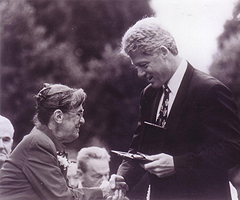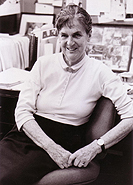

FULL STORY
Remembering Salome Waelsch
On April 14, 2008, more than 200 members of the Einstein community gathered in the Lubin Dining Hall to remember an Einstein icon, Dr. Salome G. Waelsch, who passed away in November 2007, just one month after celebrating her 100th birthday. Dr. Waelsch, who was among the founding faculty at Einstein, left an indelible impression on those who knew her, personally or in passing. The symposium in her memory offered insights and highlights of her life and career that shed light on how she was able to touch so many.
 Dr. Waelsch was born in Danzig, Germany, in October 1907, and earned a Ph.D. in biology at the University of Freiberg, in 1932. She served as a research assistant in cell biology at the University of Berlin for a year but, as Adolf Hitler came to power, Jews were being fired in universities throughout Germany, so she fled to the United States. She began her career at Columbia University in the laboratory of L.C. Dunn, a well-known scientist in the field of mammalian genetics.
Dr. Waelsch was born in Danzig, Germany, in October 1907, and earned a Ph.D. in biology at the University of Freiberg, in 1932. She served as a research assistant in cell biology at the University of Berlin for a year but, as Adolf Hitler came to power, Jews were being fired in universities throughout Germany, so she fled to the United States. She began her career at Columbia University in the laboratory of L.C. Dunn, a well-known scientist in the field of mammalian genetics.
In 1938, Dr. Waelsch made a major breakthrough in the field of genetics, making it possible to trace the effects of genes on development from the embryo to the mature mammal. This work laid the foundation for all future advances in developmental genetics. Her research proved vital to improving the understanding of birth defects, particularly understanding the cause of mistakes in the development process that result in defects.
She joined the founding faculty of the Albert Einstein College of Medicine when the new medical school opened in 1955. Starting as an associate professor of anatomy, she was named professor in 1958, and was appointed acting chair of genetics when the new department was created in 1963. In 1973, she was named chair of genetics and served in that capacity through 1976. In 1978, Dr. Waelsch was named professor emerita, yet she continued to carry on her research, coming in to her laboratory daily and maintaining her mouse colony well into her 90s.
 "Salome was a significant person in the history of science," noted Dr. Scott Emmons, Ullmann Professor of Molecular Genetics at Einstein. "The image I have of her when we met is of a radical young woman, yet she was 70 years old then and already had emerita status."
"Salome was a significant person in the history of science," noted Dr. Scott Emmons, Ullmann Professor of Molecular Genetics at Einstein. "The image I have of her when we met is of a radical young woman, yet she was 70 years old then and already had emerita status."
"She started a discipline that we now take for granted," said Dr. Lee Silver, who was a student in Dr. Waelsch's laboratory and is now professor of molecular biology at Princeton University.
Late in her life, in 1993, at a time when most of her peers were retired or dead, Dr. Waelsch was recognized for her role in establishing the field of developmental genetics, with the presentation of the prestigious National Medal of Science by President Bill Clinton. Her legacy of scientific accomplishment and moral imperative continues to inspire, and will live on in the countless students and colleagues who she so deeply touched.
Video Slideshow
(Courtesy of the Waelsh Family)
Posted on: Tuesday, April 22, 2008


